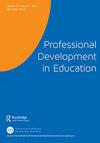The roles of the academic in health sciences: where to start from a faculty development perspective
IF 3.1
3区 教育学
Q1 EDUCATION & EDUCATIONAL RESEARCH
引用次数: 3
Abstract
ABSTRACT In an effort to offer a more focussed and competency-based approach to faculty development for newly appointed academics, this study prioritised the roles of the medical teacher, focussing on orientation initiatives. At a research-led university, we used 15 roles of a medical teacher. Health science academics were asked which professional development activities should be available to newly appointed educators with reference to teaching-learning and research development. Quantitative and descriptive research were followed, using a self-administered questionnaire which was completed by 129/256 (50%) health science academics. The top five roles were ranked as follows: Role Model for Students (83.6%); Information Provider in the Classroom (82.8%); Facilitator of Learning (78.1%); Information Provider in the Clinical Setting (75.0%); and Assessor of Student Learning (74.4%). Although research development was ranked important, respondents indicated that it should receive attention at a later stage and not necessarily during orientation. Academics (90.6%) indicated that professional career development should be individualised. Faculty development should encourage gradual development over time, addressing all the roles of the academic, including research. At different institutions, various roles are considered important; and institutional research should be done to guide faculty development.学术在健康科学中的作用:从教师发展的角度出发
摘要为了为新任命的学者提供一种更加专注和基于能力的教师发展方法,本研究优先考虑了医学教师的角色,重点关注定向举措。在一所以研究为主导的大学里,我们扮演了15个医学老师的角色。健康科学学者被问及,在教学和研究发展方面,新任命的教育工作者应该参加哪些专业发展活动。随后进行了定量和描述性研究,使用了129/256名(50%)健康科学学者完成的自填问卷。排名前五的角色如下:学生榜样(83.6%);课堂信息提供者(82.8%);学习促进者(78.1%);临床环境中的信息提供者(75.0%);和学生学习评估员(74.4%)。尽管研究发展被列为重要,但受访者表示,研究发展应该在后期受到关注,而不一定是在迎新期间。学术界(90.6%)认为职业发展应个性化。教师发展应鼓励随着时间的推移逐步发展,解决学术的所有角色,包括研究。在不同的机构中,各种作用被认为是重要的;应进行制度研究,以指导教师的发展。
本文章由计算机程序翻译,如有差异,请以英文原文为准。
求助全文
约1分钟内获得全文
求助全文
来源期刊

Professional Development in Education
EDUCATION & EDUCATIONAL RESEARCH-
CiteScore
6.30
自引率
4.80%
发文量
27
 求助内容:
求助内容: 应助结果提醒方式:
应助结果提醒方式:


